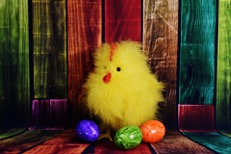1. Chocolate
Chocolate may be deliciously mouth watering but it’s a BIG NO NO for our pets. It contains a substance called theobromine which is toxic to pets. The darker the chocolate the more theobromine it contains. The type and amount of chocolate your pet has consumed determines the level of toxicity to your pet.
Signs of chocolate toxicity in pets include:
Panting
Salivation
Restlessness
Excitability
Vomiting
Diarrhoea
An increase in: thirst, urination and heart rate.
Severe cases may show:
Muscle tremours
Seizures
Heart failure
Take extra care when hiding the Easter eggs for the kids that your pet does not join in on the hunt, and ensure all the eggs have been discovered when the hunt is over.
Keeping count of the number of eggs hidden vs found is a certain way of ensuring your pet does not come across a rogue one! Animals have a pretty amazing sense of smell so keep any products containing chocolate up high and out of your pets reach!
If you suspect your pet has eaten chocolate- seek veterinary advice asap.
2. Grapes
These tiny plump balls of sweetness are now in season and can make your pet very ill- no one knows what part of the grape or how many need to be ingested by your pet to cause toxicity, each case varies- therefore it’s not wise to treat your pet to even one of these tiny morsels.
Remember sultanas, raisins and some currant varieties are dried grapes!
Traditional hot cross buns contain sultanas and raisins- NO hot cross buns for breakfast for your four legged friend this Easter! Usually signs of grape toxicity start to develop within a few hours of your pet eating grapes and can progress to kidney failure within hours.
Signs of grape toxicity include:
Vomiting
Diarrhoea
Weakness
Inappetence
Increased thirst
Increased urination
3. Easter decorations
Whilst fun and fitting for the occasion your pet may also take a liking to them. Styrofoam eggs, plastic chicks, and egg packaging, if left in their path to sink their teeth into, are a choking hazard and potential gastrointestinal blockage waiting to happen.
4. Hard boiled eggs
Some of us opt for the hard boiled type to decorate, hide and eat at Easter time. While hard boiled eggs are not always harmful to pets if eaten- large egg shell shards could be a potential choking hazard – particularly in smaller dogs. It is safer to peel and cut up a boiled egg before feeding it to them as a treat. Another concern is undiscovered hidden hard boiled eggs left over from Easter- these can go from fresh to spoiled quickly causing a huge upset for your pet if ingested. Keep a count of how many have been hidden and subsequently found.
Another thing to keep in mind is that normal opening hours of your regular vet clinic will more than likely change over the Easter period. Make yourself aware of their altered hours and familiarize yourself with where your nearest 24hr emergency vet clinic is located in case the need arises to visit a vet out of hours.
If your pet requires on going medication or a special diet ensure your pet has plenty left for the Easter period.
Delivery times for suppliers are lengthened throughout this period due to public holidays- don’t get caught short!
For more information please contact us on (02) 4362 1644







